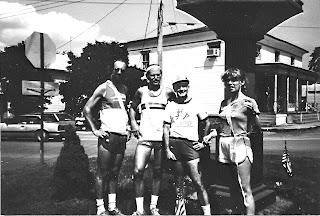Back to 10 Scary Things I Have Done Since My Husband Died, and yes, for me this was the third-scariest.
3. Learned to use the gas mower
With its fierce blade, its requirement for a poisonous, inflammatory chemical, of all the frightening things that lurked in the basement and the shed, the gas mower was the most forbidding. For two years I didn’t touch it; instead I used our hand mower, a quiet, friendly helper that allowed me to meditate over the smell of new-mown grass.
But in our third spring together I had to admit that my friend and I couldn’t handle almost an acre of lawn—front-back-side. Everything was weedy and tufted and unkempt. My neighbor kindly mowed the meadow in back of the house. He seemed to love to use his riding mower, and I might have asked him to add my lawn, but I knew I should minimize favors and figure this out for myself.
I made a ramp into my hatchback with an old closet door, and pushed the gas mower up and into the car. Just solving the transportation problem felt like an accomplishment. At the shop where we’d had our mowers sharpened every year I explained about Dan and the mower and me. When you pick it up, said the second-generation mower serviceman, I’ll show you how to use it.
 |
| I'm not afraid of all machines . . . |
And he did, taking me out to the little patch of weeds in back of the shop and showing me how to push the button three or four times and pull the chord and adjust something. He laughed when I asked how I would know when it needed more gas, but I stood there until he told me, knowing by then that even stupid questions have to be answered.
(I had also read the manual. Dan always tossed the manuals on top of the file cabinet and I put them away in folders by location category so that we might possibly find them, and since his death I actually read them. I am probably the only person in the United States who, as instructed, does not wear tie shoes when using her gas mower.)
Reversing the transportation process, I brought the mower home and I was suddenly, strangely, eager to use it. I could do this! It was starting to sprinkle, but I pushed the button three times and pulled the chord and the mower started! I mowed on the front lawn and it looked better! The sprinkle was turning to rain but I mowed on, unable to stop. Only when I knew that we really must come in out of the rain, did we.
As I chatted to the hand mower (which I still have, as security), so I talk to the gas mower. It’s more noncommittal, a sort of male appliance, in contrast to the sisterhood of the hand mower, but we work well enough together. I hate the noise and feel sorry for my neighbors (never mind that I listen to theirs, I regret adding to the noise pollution). I mow as fast as I can. I tried to reduce the lawn by adding gardens, not a complete success because then I had more weeding to do, and trickier mowing, around the gardens, which required the hand mower, etc. Now what’s scary is filling the gas can and then pouring gas into the mower because I can never figure out the spout, but I proceed through these details; my jaw may be clenched, but I do it.
Dan did all of the mowing and most of the cooking. I’ve lost weight since he died, but I haven’t got sick, and from a distance at least, the lawn looks pretty good. You clear your hurdles; you take your satisfaction where you can.



